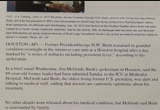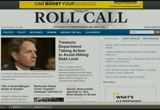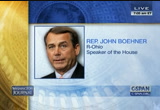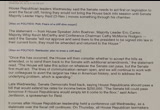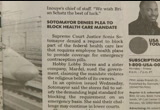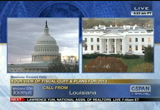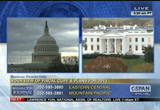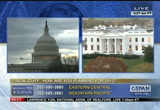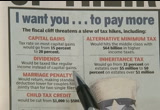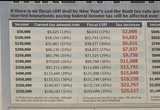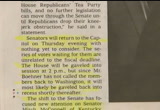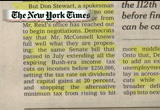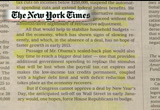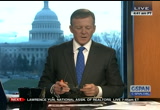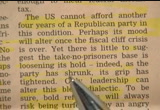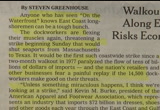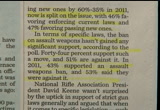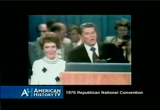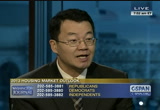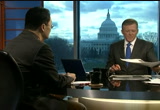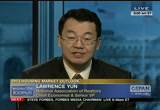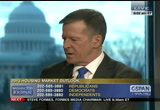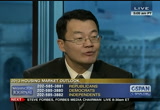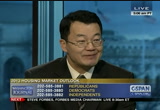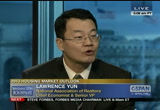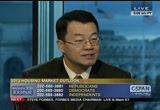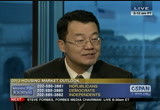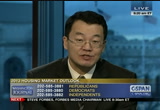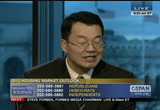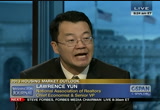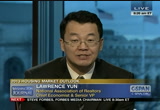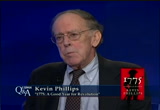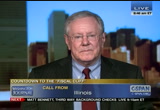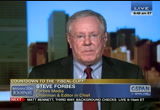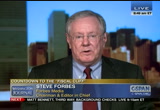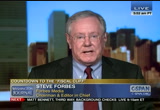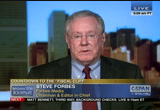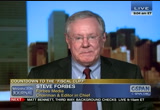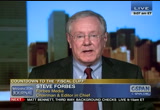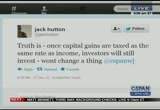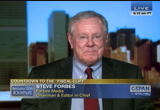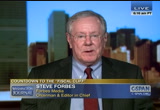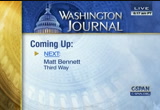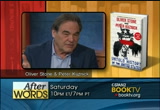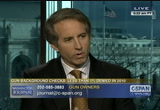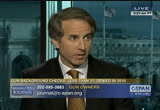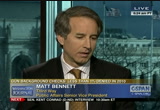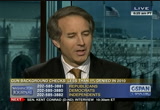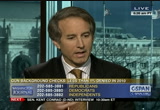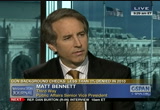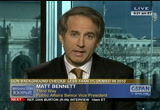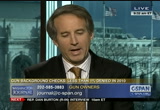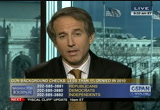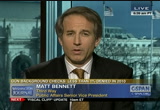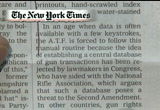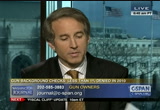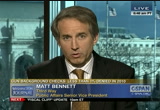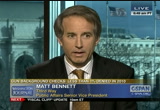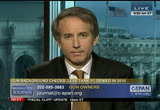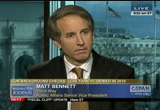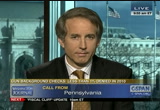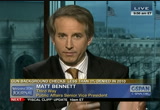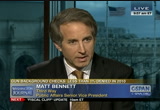tv Washington Journal CSPAN December 27, 2012 7:00am-10:00am EST
7:00 am
media chairman joins us for a look at the fiscal cliff. at 9:15, a discussion of background checks. host: the house and senate are back in session today, but the fiscal cliff negotiations are not on the agenda. during this first segment, we want to hear from business owners only. about your views on the fiscal cliff and how it may affect you in 2013. you can see the numbers on the divided by zones --
7:01 am
7:02 am
7:03 am
7:04 am
ms. shiner. guest: ms. shiner seem so formal. we're having a recession in between christmas and new year's. that has not happened since the 1970's. maybe we should play disco or maybe they should just finished their work so they can stop making terrible jokes. i think you are a point to see some push in the next few days to try to get some sort of small deal done. you have to remember and your viewers will notice, because they are fans of the legislative process, anything that gets done, it has to get done very quickly in order for there to be time before new year's for it to be approved and signed into law. today's the 27th. the senate comes back in session today, the house is in pro-forma
7:05 am
so it probably will not do any work. you only have a few days left for lawmakers to make a deal -- ink a deal. the president took off last night from hawaii, but there's a five-hour time difference. time is working against these lawmakers. they will have to figure out something if they want to do anything before new year's. it seems quite likely that we are going to go over this cliff and that whatever happens is going to have to be resolved after january 1. it has been looking like that before the holiday, but certainly now, particularly if you remember for congress broke for the christmas break, speaker raynor was not able to get the backup plan through his caucus, so there was no pressure on democrats to try to counter that immediately. senate democrats saying we passed a bill that raises tax
7:06 am
rates on incomes over $250,000, we ran on this and this is what we are offering. house republicans were saying, no, we want to negotiate something, figure it out and send it to us. someone is going to have to move. who? the president met with senate majority leader harry reid before going to hawaii and his offer was to extend the tax cuts for incomes under $250,000, extend unemployment insurance benefits, and the lady across the board automatic cuts that are supposed to start january 1. that seems to be a non starter with republicans. it's hard to see where we go from here. host: have they been talking over the christmas break at all?
7:07 am
also, one has been the role of senator mitch mcconnell? guest: the line that comes from the speakers office all the time is the line of communication remain open. i don't know how much talking they did as the president was in hawaii spending time with his family and the speaker was back home in ohio, i believe. i don't know that for sure. everyone was doing their family time and not really working that significantly on something. i think there was probably some minimal conversation, but not a lot. as for the senate minority leader mitch mcconnell, i think that is a good one. a lot has been made in the past few days about him taking a higher profile role in these negotiations. while i don't like prognosticating into the future,
7:08 am
we can look at the past in some of the previous negotiations of congress and the kind of role he has played. almost all of these talks, whether it was about government shutdown in the spring of 2011 or the debt limit debate in the summer of 2011 or the payroll tax-cut debate last year, those negotiations started at a level between the president and speaker but always broke down at that level and that pushed to the senate where harry reid and mitch mcconnell had to figure something out and get enough votes for it so they could give some cover to the house republicans, who were joined by a large majority of house democrats to get something done. the idea that we have come to this state is not necessarily surprising. that it has taken us so long to get there has probably frustrated everyone who wanted to take a holiday break. if mitch mcconnell wants to play ball, and i think there's a role for him to do so. when you speak with aids from
7:09 am
his office, they say we will get involved, but we would like to see some good faith offer from the majority leader. aides from his office. right now that process has not happened. as for for action today in the senate, it's not going to be anything where they reached the fiscal cliff. but there's not enough agreement to have the rank and file members do anything. it is still at the top level leadership discussions. the senate is going to try to finish work on a sandy disaster aid supplemental bill which they have been trying to get done for weeks. they are hoping to finish that today and also trying to work on a foreign intelligence surveillance act authorization extension. there's enough on the floor to
7:10 am
keep them busy. the question is whether they will have something to vote on may be on christmas eve. on sunday joe lieberman indicated we would all be working new year's eve. we will see that happens. host: merideth shiner, thanks for your time. we appreciate the update on the fiscal cliff. here is "politico" -- a lot of similar headlines in other publications this morning. we want to hear from business owners on the fiscal cliff and if it is affecting your plans for 2013. you can see the numbers on the screen. business owners only. small or large businesses. from the hill newspaper --
7:12 am
7:13 am
comes from jim in hot springs national park, arkansas. what kind of business do you own? caller: the last one i had, i was in the construction business. and when i sold my last house i decided to move too hot springs, the first resort in america. host: you are a retired business owner? caller: right. host: if you were still running your business, how would you be looking at the fiscal cliff? caller: i've got some ideas i would like to say. the first thing we would do is eliminate all the people that do the free housing and food stamps and by about all those office expenses and just go with an earned income credits that
7:14 am
would not exceed 15 cows and dollars per year. -- $15,000.ould that affec it would help reduce the need for taxes, so they would have more money for others things, rather than paying taxes. if the current welfare system pays people as much as $45,000 a year to add up all the benefits, the free medical, with medical,to doctors or hospitals would cause normally $1,500 a month, but an insurance company for a family, and they get about $800 a month for free housing and another $700 a month or $800 a month for food. so they don't have an incentive to get a job that pays an average worker $33,000 a year, because they are getting more
7:15 am
off the free stuff. another thing that i would do would change the education system to where in your senior year and you decide whether you will go on to college or be a blue-collar worker. if you are going to be a blue- collar worker, you go into apprenticeships for the last year of high school plan that particular field, because now these high school people get out of high school and they don't know how to change a light bulb and they end up not having a skill and they don't have the money to go to school for whatever reason and they don't learn a skill. so they end up on the welfare system. if you took that last year of high school and taught them a skill, then they would have a skill and able to earn money and
7:16 am
not go on welfare. host: let's leave it there, jim. on facebook -- brad in victorville, california. good morning. are you with us? last chance. we will move on to doreen in connecticut. caller: i'm a small business owner. host: what kind of business? caller: i do alterations. in the evening return our business into a zumba class for ladies. my daughter and i seem to be doing pretty good. the ladies we hire as
7:17 am
seamstresses are independent contractors. these are skills they got from their parents who taught them how to sew. we just went and put out advertising saying we needed seamstresses and we got six good seamstresses. we pay them enough that they can get their own health-insurance and they seem to be doing pretty well. i don't think that giving people the assistance in helping to further their endeavors is a bad thing. i think people who tried to stop people from making it further, they are just being selfish, because you can help individuals if they have skills. they don't have to have a college education to have certain skills. you can use those skills to your advantage and still help them along the way. they can get thrown help insurance. small businesses really are not hurting in the way they are making it seem. host: have you looked into the fiscal cliff and how it may
7:18 am
affect your business in january? caller: yes, and i don't mind paying my fair share. but you have to want to give the next person helping hand. host: all right, thank you so much for calling. you said that you rent out your place for a zumba class in the evening? caller: yes, in the evening when we are not sewing. we substitute and say let's do a class, the couple hours. the ladies bring friends and it increases business. and more people say i need this done or that done. it's a form of networking. but you have to put the endeavour into it to get something out of it. a lot of people just want to take and don't put anything in. you just have to want to put it in. host: guy is a business owner in hillsdale, new york. caller: i have a small music
7:19 am
label. i discovered some news by kurt bayo. i cannot get a major label to put the music out, so i decided do it myself. host: have you looked at the fiscal cliff and how it may affect your plans for 2013? caller: of course. this is all about paying for the wars, to me. host: as a business owner, how is it going to affect you? caller: it is not going to affect me. these are taxes i should have been paying a long time ago. host: ted is in los angeles. good morning. caller: good morning. i have a comment and question. when i am trying to say is at the turn-of-the-century, major
7:20 am
leaders saw the need to change the 12-hour workday to the eight-hour workday, which brings us to the present. my question is, does the work they need to be changed maybe to a six-hour day in order to order accommodate employment for the growing america? i used to own a graphic arts business. it was very difficult to keep employees. i ended up being the only employee. host: you are retired now? caller: yes. host: steve in phoenix, kind of business do you have? caller: i have a trucking company. we move products locally in the state of arizona.
7:21 am
the fiscalw how cliff is going to affect me personally. since we cannot produce things, any company that is affected negatively, that will affect us negatively. withn't really do anything any government entities. directly speaking, i don't think it will really affect our customers, because they don't really do the kind of stuff that works with the government. they do the kind of stuff with businesses, manufacturers. the stuff that we carry does not have much to do with defense. a certain group of people say that we need to have cuts. then when the cuts there them in the face, they say not those cuts. that's the real problem. e their owns to gordon ac
7:22 am
7:23 am
doc in baton rouge, louisiana, good morning it. caller: i have my own insurance agency. host: talk to us about the fiscal cliff. caller: i am kind of concerned about it. one party makes a recommendation and never followed through. we don't get very much cutting in these negotiations through the years. in 1990 the democrats said that
7:24 am
they would do spending cuts, but they did not. everytime i see a young child, 5, 6, 7 years old or younger, i pat them on the head and tell them i am sorry the countries in this mess, they're going to pay for it, because we have too many greedy people who came up through the 1960's and the only thing they are concerned about is . is we're in for a road through the next few years. host: thank you for your views. from accounting today, this article appeared a couple days ago.
7:25 am
7:26 am
cliff. nobody said what the actual fiscal cliff is. to try topoinloy confuse the american people. nobody has ever told us what the fiscal cliff means. it does not mean anything. it is all a plou. host: jack in montana, your on the air. caller: hi. i wanted to say that we just got an announcement -- i have a small business on the side, but i also am employed by a large employer. we got an announcement yesterday that they are going to raise our withholding rates and social security withholding. it is going to cost the average person a lot of money.
7:27 am
i don't think there's any doubt that the fiscal cliff is bad. host: what did your notice say? caller: it said that tax tables will be used for 2013 and that you can expect that your check will be greatly impacted by the increased taxes and social security withholding. host: who do you work for? caller: the state of montana. host: david in pasadena, maryland. caller: good morning. i think if you change the name, it might give a better perspective. it should be called the bush giveaway fiscal cliff. we will be returning to what we had when he gave away all that money at the beginning of his
7:28 am
administration. my personal situation, my fiscal cliff was reached when they eliminated stem cell research. i manufactured filtration products for medical research laboratories. when they stopped funding stem cell research, not only mine but our whole industry businesses went down the tubes. you cannot fall off a cliff for new authority to bottom. i am struggling along and making do. i lost quite a bit of money over the first couple years. it's come back somewhat, but nothing like it used to be. i don't see it affecting me personally. i think the key is -- i hear all this talk about how to revive jobs. if people had money to buy products, companies will prosper and everybody would be doing well. all this other stuff, funding this and funding that, just make sure people have the money to spend the money. that's the bottom line for me. host: what about capital
7:29 am
expenditures? are you holding off? caller: every time they institute capital expenditures and put a sunset to it, my business pops up and when it goes away, it disappears. that's really important factor for a small manufacturer like myself. host: i'm sorry. i thought you were finished, david. the new york post this morning as a whole section.
7:31 am
caller: yeah, i am a truck driver. i live in maryland and have a lot of friends from baltimore, philadelphia, and just the thought of the bush tax cuts being cut or being discontinued makes everybody's taxes go up. .'m already paying fuel tax if you hall piece of freight from baltimore to philadelphia, it pays $285, a u.s. just put $200 ridicule in your truck. he spent $36 one-way on a bridge, $18 through the tunnel, next year it goes up to $48 for the bridge. $24 for the fort mchenry tunnel.
7:32 am
7:34 am
7:35 am
caller: i am in the rental business in california. i hear california is very big on welfare and section 8. i see there are so many programs where somebody gets to stay home and the government will pay a three-bedroom rent and they only pay $14 a month. they stay home for 10 years, 15 years, or whatever simply because they have children. being in the military, a lot of my friends, the parents work. but these people are not in the military and they get medical, they get food stamps, they get wic. there's never a change in the programs to motivate people to go to work.
7:36 am
host: what would you like to see done? caller: i would like to see that the welfare and section 8 programs and these programs out there, that they tell the people you go to work and we will subsidize -- we will give you a small check to help you support your little family. a lot of these people on these programs are not married. they are single parents. my friends in the military are single parents and they are working. the mother or the father works and they are raising the children. i don't see where they make modifications to your people have to go to work and the government will subsidize them, help pay for groceries and pay the medical for the children, change that so we're not supporting them 103%. host: this is the new york times lead editorial this morning --
7:38 am
that is the "new york times editorial page. bill is in louisville, ky. caller: i called in to try to define what the fiscal cliff is. i got math and physics 30 years. i am now retired, but i get the impression of lot of people calling in don't understand what it is or what it entails. i will guarantee that 90% of the people who went to the polls and voted this year voted for romney and obama cannot differentiate or define the difference between the annual deficit and the national debt. the national debt is the fiscal
7:39 am
cliff. we say it's unsustainable. from a mathematical standpoint, it is almost insurmountable. the only thing these taxes will do, i have graduate students who could not put into words what a trillion dollars was. host: go ahead and finish your thought on what these taxes will do. caller: what they will do is they will give the politicians a little leeway to fool around with the national deficit, the annual deficit, but they will not put a dent in the $16 trillion debt that we owe. that is the problem. host: we appreciate that call. over the past couple weeks, c- span has been conducting interviews with some of the retiring members. we have been showing those interviewed this week. tonight, one of the retiring members we spoke with is representative lynn woolsey, a democrat of california, served about 20 years. here's a portion of that
7:40 am
interview. [video clip] >> i was on welfare because my children, ages 1, 3, and five years old, their father was diagnosed manic depressive, he would not do anything about it, so i became the sole responsibility for my children. we started a new life. host: those interviews with the representative and her fellow californian, representative gary lewis, a republican of california, will begin tonight at 8:40 p.m. -- jerry lewis. larry in canton. callerhas it affected your plan? caller: no, i'm hiring people and life is good. let's tackle this $16 trillion
7:41 am
debt. we have to pay more, let's pay it. we as american citizens, we can do this. again, for those folks who do not want to work, we should send them home. mr. obama was elected, so live with it. he is the president. i want to do my fair share. if i am ok with paying a bit moe taxes to make sure our country gets out of this quagmire. god bless america. host: that was larry in massachusetts. the lead editorial this morning in the financial times --
7:43 am
again, that's from the financial times. michael vincent, statin island, new york. good morning. caller: good morning. pastor of one world life systems. on the darkest day of 1990 in washington, d.c., i began my ministry. that is something people don't realize, especially those who attack those who work with the indigent or support for the struggling -- or the poor.
7:44 am
when i was back in d.c., we had dan and bob and they sat in an irish bar around the corner and worked out the tax bill in 1987, i believe the year was. that's the kind of leadership the article was just talking about. instead of the people that call up and paris at the propaganda, we really have to be practical. -- that parrot the propaganda. a house divided cannot stand. let me give my personal example. i live on $6.66 a day. that is food stamps. that is for single adults. i live on social security, $774
7:45 am
a month. i am trying to go back to cornell to do sustainable energy. we are in a double down on reaganomics in despite. jimmy carter had great inflation because for five years we were a peaceful country again. then reagan put us back into the largest military buildup in peacetime. i think that's what we ought to do is realize that did not work, just like some of the new deal stuff was not working correctly. what we have to do is c- span.org [indiscernible] i want to thank mr. richard delver of the department of transportation, because unlike michael bloomberg -- host: you have gone a little bit off track, but we appreciate your comments this morning.
7:48 am
coming up, steve forbes will be here in 45 minutes to take your calls regarding issues in washington, including what we just talked about. next is lawrence yun of the national association of realtors to talk about the real estate market and how the fiscal cliff could affect it. we will be right back. >> ♪ [video clip] >> there are six who say that a party platform is something no one bothers to read and does not often amount to much. whether it is different this time than it has ever been before, i believe the republican party has a platform that is a banner of bold, and mistakable colors with no pale pastel shades.
7:49 am
>> the 76 campaign is interesting because you see the evolution of reagan, his mind, its velocity, is politics. he talks in this speech about hope and the future and a future without nuclear weapons and america free of nuclear weapons. being aimed at weapons it more progressive. . it's . you are the world is not just a denunciation of big government liberalism. you can see his anti-communism evolving, is cultural views evolving. he has not yet gained or acquired the tax cut philosophy which fit so nicely into his optimistic outlook of empowering individuals to determine their own lives. >> saturday night at 8:00 eastern, the political campaigns
7:50 am
of ronald reagan, part of four days of american history tv, right through new year's day, on c-span3. [video clip] >> i just enjoy that it is straight forward, comprehensive, really to sense what is happening without a pundit interjecting and that's what i really appreciate about c-span. definitely a great resource for anyone looking to become more familiar with how government works and the ins and outs of capitol hill. >> julie watches c-span on verizon. c-span, created by america's cable companies in 1979, brought to you as a public service if by your television provider. >> "washington journal" continues. host: lawrence yun is the chief economist and senior vice president for the national association of realtors. how would you assess the housing
7:51 am
markets today? guest: thanks for inviting me, peter. housing market has turned for the better in 2012. the home sales overall look to be about 10% better this year versus last. home prices on average are up about 5%. in some parts of the country, it's up better than 20%. you are seeing places like las vegas and miami where it's about a 10% gain. there's local market variation, but overall the housing market is recovering. host: if the u.s. government and american taxpayers go over the so called "fiscal cliff" what do you foresee for? the for? guest: the fiscal cliff is going to shave off about 4% of gdp, so that the national economic growth. currently is growing about 2%. you can do very simple mathematics. and we are back in a recession.
7:52 am
we can anticipate 1 million or 2 million net job losses in 2013. it will be difficult for the housing market to continue its momentum without jobs. so we hope that this cliff can be averted. host: when you look at negotiations going on in washington, does your association have a favorable path towards achieving the fiscal cliff? guest: a $1 trillion budget deficit we have been running annually, that is unsustainable. something needs to be addressed. the shrinking of the time. we have, one has to get something done quickly and then a grand bargain as to get done in the springtime to fundamentally address the long- term budget deficit. but after get over the short- term obstacle. we're not looking for any specifics related to whether it
7:53 am
should be government spending cuts, tax increases, but one thing we are very mindful of is that some politicians have been discussing a mortgage interest deduction as a revenue source. we are opposed to that. 7500 homeowners will be impacted by that. we are aware of that being on the table. host: when you talk of a grand bargain later on, if you are looking at the short term fix and then a grand bargain later on, the mortgage interest deduction could go away. would the realtors fight that productideduction? guest: i don't think it will go away. it always comes on the table every decade or so. it's been in place a hundred years. we have to recognize over this time span that 13 u.s. presidents were able to handle the budget to ration without
7:54 am
touching the mortgage interest deduction. i think that will also be the case. it's difficult to see an elected official, members of congress going back to their districts to say we are destroying or housing wealth. so i don't think it'll happen. host: there's this article in the wall street journal with charts showing various cities around the u.s. and how well they have done in the last year or so. overall, still down. phoenix, up 21% this year. and this article appeared in yesterday's wall street journal -- what is the realtor
7:55 am
association's view on the national governments refinance programs they have offered and how do you see expansion of that program? guest: it has worked. this program specifically addressed responsible homeowners. these are homeowners who happen to be under water, yet they have been making their mortgage payments. they may be stuck at 6% or 7% interest rate. the prevailing market interest rate is about 3.5% or 4%. government stepping in to say you have been responsible even in this difficult economic circumstances, if you have to pay your mortgage on time and not defaulted, so let's get you into the current market rate. from the private lenders perspective, they are saying under water, forget it, we will not refinance. for government to step in to help responsible homeowners, it makes perfect sense. host: if you want to dial in to talk with lawrence yun on the 2013 housing market update, the
7:56 am
phone numbers are on the screen. mr. yun, are any other mortgage housing related issues affected by the fiscal cliff? you talk about the potential of the mortgage tax deduction, but what about on january 1, are there any other tax changes for program changes we should be aware of? guest: the extension of the mortgage forgiveness should be extended. this is referring to people who are under water, they need to sell their house, so they need a short sale approval where the bank would forgive their debt of. the underwater of from the point of view of the irs, they consider that taxable. taxable if the extension is not prolong. so that is people who went through a difficult time and went through a short sale, they went through a very stressful
7:57 am
financial times and for the irs to say now you have an additional taxable income, does not make sense. we have a bipartisan support to extend this. hopefully we can find a vehicle to attach it to and get it extended. it's only $1 billion price tag. a very small amount compared to the $1 trillion budget deficit we have been running. host: you have been quoted as saying -- with the fiscal cliff we will see 1 million job losses. guest: that is the assessment we have been getting from the running of our models. the economy should be expanding to% or 3% next year without the fiscal cliff, that would correlate with about 2 million net new jobs next year. so it's a continuation of a steady expansion. i wish it was a little faster
7:58 am
expansion, but nonetheless it is an expansion. if we had a fiscal cliff, and we are reversing all the gains we have seen. host: what about mortgage deduction on a second home or vacation home or a certain limit to the size of a mortgage? would you be supportive of that? guest: we have to recognize that negotiating away from what has been a striking departure from just protecting the mortgage interest deduction, property ownership. any breach to that invites further breaches. our members, even though they recognize the deck is a need to be resolved, any breach will lead to further coming back, loring the income limit. -- lowering the income limit. we have to recognize many of the second homes are in places like michigan, wisconsin, arkansas,
7:59 am
where people are looking for a weekend fishing lodge. very not the hamptons or expensive homes in beverly hills. many homes are scattered in the midwest. host: our first call for lawrence yun comes from dan in virginia beach, virginia. caller: i'm interested in this topic, especially being under water. but not terribly under water. some time ago, the president suggested that all the banks or lenders should forgive the difference between where the market is and what they borrowed. bankught, there's not one on earth that will do that. here's an idea. i pay $135 a month in my payment for private mortgage insurance. since i have had this home loan,
8:00 am
it's over $6,000 that has gone through this private mortgage insurance. i thought, if the president wants to do that will lower my payment or increase my payment and that would be a better way to move the housing market forward. i am interested in any comment on that matter. guest: the first think most people would agree on is that market interest rates is 3.5%. to match up the market interest rate will save about $250 per month. a second part is the housing market recovery. we have seen two million people
8:01 am
that have been under water now above water. we're looking at another two million people that are coming above water. we need to assure that the housing market continues. this is based on the solid factors of supply and demand. this is not the bubble years. those were mistakes that should not have occurred. job creation and affordability. we need to assure the housing market recovers. those are obstacles and we need to make sure they do not occur. host: ron tweets in -- guest: the foreclosure inventory
8:02 am
remains large. it has been diminishing in the past couple of years. the peak was in 2010. 2011 was lower. we have about 22% of all transactions classified as distressed, either short sells. it had been one third of all transactions a couple of years ago. the distressed property transaction went even further next year, maybe 10% or 15% of all transactions. we are not back to normal by any means. host: we have a tweet frorm liz smith.
8:03 am
guest: the market has recovered. the factors that contribute to the recovery helped. the job creation and the bursting out of household formation. this is where many of the adults are living with their parents. that is reducing housing demand. we're seeing many young adults branching out. sometimes they are going into rentals. rise in rents -- people do not want to pay higher rents. host: vincent in connecticut. caller: good morning. thank you for appearing. i refinanced this last spring and summer and it was a
8:04 am
spectacular success. there was a real savings of about $360 a month which is nearly $4,000 a year. with the recent proposals to expand or keep going the program, where is the brunt of the money that is saved? who ends up paying for it? guest: we have to recognize that -- etting into the market when we have a program that is lowering the rates, their income level is going down. the banking industry was receiving a high interest income and now they are receiving more market competitive income.
8:05 am
the profit levels are back to pre-recession levels. there is plenty of cash reserve. days rate is at 3.5% -- the current rate is 3.5%. it makes perfect sense. it is good to hear about your specific example of saving $350 per month. host: we have a tweet from bill badey. guest: around 25 million homeowners benefit from that in any particular year. in the early years, they used it and greatly benefited. we've looked at the demographics of it.
8:06 am
it is primarily younger families. over time, they are paying off their mortgage and they do not use the mortgage interest deduction over time. that is looking at the one side of the accounting ledger. 90% of income taxes are paid by home owners. taking away mortgage interest deduction would mean a higher percentage of taxes would be paid by home owners. host: this is from michele. guest: that is one frustrating aspect. mortgage rates are at historic lows. this is a great time.
8:07 am
the time life is much longer. the credits core requirement has been ratcheted up. in the past, someone had a credit score of 720, they would be able to get a mortgage. it requires a score of 760. the housing market was not very normal, people with 720 credit scores would be able to get mortgages. now they are having a tough time. and of the role played by fannie and freddie, pushing it back to the bank. the banks need more clarity about what the rules are so they
8:08 am
8:09 am
guest: absolutely not. we need to have a sustainable home ownership. wall street was going wild and fannie and freddie were going wild and that led to terrible consequences. when people buy a home, we need to make sure they can stay in their home. the greatest increase in home ownership appeared after the second world war. these were successful home ownerships. some policies -- do not overstretched your budget or you will go into trouble. we had a successful home ownership back then. host: alan, thank you for holding.
8:10 am
caller: good morning. i have some close friends that are realtors in arizona. they seem to feel some provisions in the dodd-frank bill as far as appraisals go has dampened the real estate market here. they tried to explain it to me. i was wondering if you could explain what those restrictions are on appraisals and what they are meant to do, the benefit. they have some investment properties. they have excellent credit and they cannot seem to refinance those investment properties with any success with that high interest rates. thank you and will listen of the year. guest: appraisal is a friction
8:11 am
that is present in the current market situation. everything was all set to go. the buyer and seller agreed to a price. someone has to make up for the difference. oftentimes that is a deal breaker. appraisal is a fraction of the marketplace. that is to make the banks become overly conservative as to what the values are. it was needed when the prices were falling. prices now are rising and so the appraisal issue should be diminishing. that should not be troublesome going forward. we hear that appraisals are
8:12 am
still a deal breaker. the banks are becoming overly stringent in their standards. we need to have sound underwriting. 15%-20% of people are not getting mortgage approvals. host: we have a tweet from joseph. guest: i think the tax rates do not impact in terms of the direction of the housing. we had a steady improvement in housing just over a great number of years. then wall street and fannie and freddie were chasing after every small marginal potential home buyer. that was a key reason we had the housing crisis.
8:13 am
host: wanda in new york. caller: good morning. thank you for taking my call. we have a home in new york. i do not see prices rising in my area. we have a home in florida in a new development that we bought in 2006. our interest rate is 6.5%. we are unable to refinance and severely under water. maybe half of the homes are sold. we do not have a fanny or freddie mortgage. what is there for us -- we do not have a fanny or freddie mortgage.ddie
8:14 am
it just seems clear on this treadmill and we cannot seem to get ahead. do you see there is a potential for us going forward in helping people with that second home that is severely underwater with a 6.5% interest rate? guest: the mortgage availability for second homes. the difficulty of getting the mortgages for second homes and stringent in getting a mortgage. they are a great help in the overall recovery. they are not participating
8:15 am
other than all cash buyers. the all cash buyers are having a field day because there is less competition. there are few states yet to recover. new york, new jersey, connecticut, and illinois. they have judicial foreclosure process. a person does not pay mortgage for six months, it goes through a court system. and of sympathy, the foreclosures are not coming on to the market. there is a large overhang of shadow inventory. prices are not recovering in these four states and mentioned . the bank will take over the property and put it on the market and investors will buy
8:16 am
the property. it sometimes takes two or three years. the backlog is holding back in states like new york. host: nmaverick tweets in about her credit score. caller: a cab driver bought a condominium with a loan. i think miami has recovered somewhat. you have to have a job to buy a home. the reaction to what happened in housing is overreaction.
8:17 am
the requirements to buy homes are generally 20% down and sufficient approval monthly income. after world war ii, you had to prove what your income was. there was sufficient investigation to determine whether you are capable of buying a home. guest: the caller is absolutely right. the bubble was created because of loans that did not have documentation. many of the state income loans, where a person stays their income, you will be found at perhaps 80% to 90% is false information. we need to ensure that people
8:18 am
are staying within their budget. that is just common sense. perhaps you will make it, but there is a chance something bad could happen. host: where d.c. mortgage rates going -- where do you see mortgage rates going? guest: they could rise slightly if the economy improves. the federal reserve does not directly control the mortgage rate. it is controlled by the bond market. the bond market is watching for a sign of inflation. the federal reserve is stating they want to see somewhat higher inflation, which is not good for the bond market. the bond market may charge
8:19 am
higher interest rates. the interest rates could be slightly higher. nothing alarming. it went to 4%, these are still attractive interest rates. host: the housing outlook for 2013 -- two million net new jobs without going over the fiscal cliff. hudson, florida, gene. caller: happy new year's and happy holidays. i have a mortgage that is under water. it is a private mortgage
8:20 am
company. i do not qualify for the refinance. president obama said he was going to try to get some legislation through for all homeowners under water that's been paying their mortgage on time and i'm one of those millions of people that are in the situation. i cannot refinance because my bank is not take fannie mae or freddie mac banks. if you think that legislation will be approved in 2013. guest: there is bipartisan support for that legislation. we hope it gets passed in early 2013. the president has indicated he wants to sign it. these are people that have been making payments on time during the
8:21 am
difficult economic conditions. to say banks right now have huge profits. 7% mortgage rates -- these are bonus profits for the banks. it would make perfect sense and rewarding those people who have been responsible. host: another call from florida. this one in miami. caller: good morning. if you sell your house and get a profit, you don't pay taxes on tit. on the fiscal cliff, how does that affect people that are selling? guest: the capital gains tax rate will be rising to 20%.
8:22 am
there is an exemption. the first half million dollars will not qualify as additional capital gains. for most homeowners, if we have fiscal cliff, the selling of the home, there will not be a cowboy gains taxes associated with it. that would fall under the exemption of half a million dollars for most families. host: we have a tweet from boringfileclerk. guest: enlarge tax increase and large number of middle class families and there will be -- they will be hesitant to buy a home. s stillre subprmime loan
8:23 am
being marketed? guest: for a subsection of the population, perhaps it is -- say a young couple, one is a medical doctor and one is a lawyer, graduated with high debt. people can see to have high income potential. in mortgage that does not qualify as standard may be for this family. the subprime loan began to give out to anybody. heartbeat.h a card that was a mistake.
8:24 am
the subprime mortgage originators suffered greatly. they suffered great losses. many of the lenders disappeared. um lenders are recognizing that because of the requirements, there could be a sub market. it's still less than 1% of the loan origination is subprime. host: dodd-frank change the mortgage business? guest: we just want it to go back to normal. that is one aspect. there are still many elements that are not yet implemented. there is qualified residential mortgage which could impose 10%
8:25 am
or 20% minimum down payment to purchase a home. that would be a huge obstacle for many middle class families to turn from renter. history has demonstrated even with zero downpayment, as long as people stay within their budget, people can become successful home owners. wheat are still monitoring certain aspect of dodd-frank that has yet to be implemented. host: grace, please go ahead with your question. caller: i live in new jersey and i wanted to know if anything would address the high property taxes. homes are now devalued considerably and are being appraised for much lower. is there anything that would
8:26 am
reassess the high taxes we are paying? guest: it is not a federal issue. what we hear often from the southern states is that they are receiving former residents of new jersey that are buying homes and the tax bill goes down from $20,000 a year down to $2,000 a year. it is essentially a local and state tax competition. the high tax rates in new jersey -- that is one reason why there is a migration out of new jersey to other states. host: doug from kansas. caller: good morning.
8:27 am
it appears there will not give new mortgages because they want to collect the higher interest rates. seeing the stock market crash -- would it make sense to loosen it up? so somebody with a 700 credit score, they can save us in the economy ahead? guest: i agree with the caller. the person that cannot refinance -- as is profit going to the financial industry. it's unlikely we'll go into another financial crisis.
8:28 am
given the competitive forces and mortgage rates today, people are competing at 3.5% but not willing to refinance. this is bonus profits. host: jeffrey in california. caller: good morning. thank you for taking my call. i am a veteran, 20-plus years in the military. i bought a home in july of 2006. i pay $565 roughly. i am at a point -- i pay about $3,000 a month. my mortgage will not work with me to lower that. what are my options? guest: you can still refinance
8:29 am
into other mortgages, things like fha or contact your local banks. people who bought at the peak of the market in 2006, everyone has experienced a price drop. even the recent price recovery, people who bought at the peak are still a long way to fully recover the values. it will take an additional 3 or four years to come back. the only option is to get that refinance. look at the various hart program. it helps the responsible refinance into lower interest rates. host: what is the role of fannie
8:30 am
mae? is there a policy position on fannie and freddie? guest: they were chasing after subprime mortgages and that led to the problem. the mortgages are boring product. it's not like apple computer. 30 year fixed your mortgage. stay within your budget and we will give you the mortgage. hedge funds betting on the market. that is wrong. the backing of the mortgages is essential. without the backing, the 30 year fixed mortgage could disappear. host: lawrence yun, we
8:31 am
appreciate you talking to our viewers. up next is steve forbes. after that we will be talking with matt bennett about gun background checks and gun sales in the u.s. mr. forbes coming from our studio in new york in just a few minutes after "washington journal" continues. [video clip] >> that they really started to get worried in the summer and fall of 1774. the british admirals and generals and diplomats were reporting to the crown that the colonists were sending ships everywhere to try to get ammunition and muskets and cannon. this was after the british had
8:32 am
sent more troops to boston after the boston tea party and the so-called coercive acts, and it's clear that the colonists were pulling together ammunition and cannon. maybe they didn't intend to use it. that was a big debate. the king on october 1774 basically prohibited british ships from taking ammunition and everything to the colonies unless it was officially sanctioned. they were very alert to this. as soon as the colonies found out about the order prohibiting ammunition and munitions from being sent to the colonies in new hampshire and rhode island, patriot militia took over the forts and took the ammunition and cannon they could get, so everybody knew it was coming in the winter of 1774-1775. >> in his latest, kevin phillips suggests that 1775, not 1776, was the critical launching
8:33 am
point of both the revolutionary war and american independence, sunday night at 8:00 on c-span's "q&a." >> "washington journal" continues. host: joining us now is the chairman and editor in chief of forbes media, steve forbes. he will be with us for the next 45 minutes to take your calls. let's start with where we started this morning on "washington journal." have you looked at the fiscal cliff and have you made plans or altered your 2013 spending as a business owner on this issue? guest: the interest not yet. the big factor will be what happens in health care, which
8:34 am
kicks in it in 2013 and 2014. you're kind of immobilize until we get a fix. we are moving ahead on the projects we are doing. people are being cautious. we hope this thing will be successfully resolved and that we do not go into a recession next year. host: how would you like to see this issue played out in washington? what is the best economic solution? guest: the best economic solution is to avoid raising taxes. the best we can hope for is that they kick the can down the road for a couple of months. you are not going to resolve entitlements in the next few
8:35 am
days. some of these issues will take serious discussion. it will probably be february and not december 31. that is on the horizon. try to do it in a more deliberate fashion. that would be better than doing a quick deal. that is a habit in washington. host: like is it important not to raise taxes on anyone? guest: the u.s. economy is still wobbly. southern europe is in a severe recession. germany and france are about to go in recession. when you have a shaky economy, piling on taxes does not work.
8:36 am
spain's has been raising taxes. we have not seen anything like this with governments deliberately raising taxes on a scale since the early 1930's. they should be going in the opposite direction. they are putting more burdens on the private economies. host: somebody who may be in your income group wrote an op-ed about a month ago and this is part of it. i want to get your reaction.
8:37 am
guest: in terms of income and what people effectively pay in tax rates, people and higher incomes pay effective tax rates three times those earning middle incomes in this country. salaried income versus capital gains gets confused. capital gains are no sure things. it is a high-risk proposition. there has always been a lower rate for capital gains. you would see this economy crater and hope of investment and go by the boards.
8:38 am
bill clinton lowered the tax rates. to reverse that trend, that was a bad decade, the 1970 's. we have seen that in other countries. raise the rates and you get less investment and a lower standard of living. host: do you think the debt ceiling should play into the fiscal cliff negotiations? guest: it looks like it is going to do so. i was surprised to hear the december 31 deadline. people are taking income this year in anticipation that rates may crop next year. whether it is december 31 or march 1, the clock is putting
8:39 am
that in play. there are sensible things that can be done on the debt ceiling crisis. take social security trust funds and pay benefits for three years or more. the reserves are in junk, not marketable iou's to the treasury department. they should be turned into marketable bonds. it can sell the bonds and continue to make the benefit payments. should have been done in a long time ago. if a company had taken workers monies for pensions and spent the money. if you put that in a not marketable iou, you would be
8:40 am
wearing big strikes today. -- big stripes today. that should be changed. host: we have a tweet from wah. guest: the answer is yes. we should focus on how we get this economy moving again. can reform this hideous tax code. i have been in favor of a simple flat tax. a family of four would pay no federal income tax on their first $46,000 in income. no tax on savings. if you make the money, you pay
8:41 am
tax on nit. at the lobbying would go by the boards. it has been amended 14,000 times. nobody knows what is in the thing, not even the irs. host: steve forbes is our guest . there is the cover of his newest book. it was published this year. he was interviewed earlier this year about this book. the interview is about 30 or 40 minutes. you can watch the full interview online. steve in wisconsin on the republican line is our first caller. caller: good morning. my question to you is -- nobody
8:42 am
will not address the issue of the bureaucracy. you go on line and let that the department of energy or the department of education and the number of employees they have. we do not need all that. they can cut the number of employes in half and we would have real savings. nobody will address these issues. i'll hang up. guest: when you have a budget in washington, it is hard to cut back politically. if you do, people say you are against the were the goal. there was a british historian in the 1950's.
8:43 am
after world war i, britain had the largest navy in the world and they reduced the size of the navy. the laid-off sailors and dock workers. the agency running the navy was getting bigger as the navy was getting smaller. he made the discovery -- the size of a bureaucracy has nothing to do with the amount of work the bureaucracy does. it will grow unless it is reined in. the bureaucracy was getting bigger. if you get that kind of bloat, get in trouble and you change or go out of business. ronald reagan said the closest is a to immoralitality
8:44 am
government agency. caller: good morning, everybody. do you think capitalism and privatizing is withdrawing the money from the united states? they charge outrageous rates when the government could have maintained the prisoners cheaper. blackwater getting outrageous amounts of money to do things for the government. think that is draining our money. the money% withstood and that is why we are falling off the cliff. guest: it goes on the subject of crony capitalism. that is businesses that are dependent on government contracts.
8:45 am
that is not free markets. if people can compete, that's fine. too often these cases are non- bid contracts and you get disasters like solyndra. meritocracy verses cronyism. meritocracy is like a company like apple. if you like them, apple does well. with cronyism, you become politically connected. cronyism is something we have to fight and get real competition and free markets. host: in the book, there are
8:46 am
8:47 am
host: i think we got your point . do you have a position on the so-called war on drugs? guest: i shake my head a little bit. many of the advocates of legalizing marijuana of those that will lead the charge like the mayor in new york against smoking. in terms of marijuana, with the appropriate warnings and the like, you can make a case for it. when you get addicted to those things like cocaine, it is difficult to get you off of it. much harder than cigarettes and
8:48 am
liquor. you have to have gradations. when people get paroled from prison, oftentimes a nuclear weapon. they go back to using drugs. do you throw them in for another five or 10 years? do you let them go? spend a night in jail. there is a lot of gradations on this thing. that debate will be joined. in terms of medical marijuana, there's an element of marijuana that i do not understand they cannot extract that part of tit that people in pain can get those properties that ease the pain without having to put that
8:49 am
smoke in your lungs. host: the think speaker boehner it should be reelected when the new congress convenes? guest: i am not happy with the performance of the whole leadership. it gets back to who would you replace him with? i did not think paul ryan has an interest in doing it. the republicans should be sitting down and asking themselves why they let the democrats define the rules of debate on the fiscal cliff. the house should have passed a bill saying you cannot use money for medicare to finance obamacare. the plan to finance obamacare and the house should have passed a bill on that.
8:50 am
or how about passing a bill that any reform of entitlements -- medicare and social security -- cannot involve taking away benefits from those on the system today and those about to go on the system. you can make good reforms to young people. they should have passed a tax simplification bill. host: next call comes from john in pennsylvania, republican line. caller: good morning. president eisenhower, the rate for the top taxpayers never went below 91%.
8:51 am
now we cannot seem to get it up to 39%. in 2001, we had the largest budget surplus ever. 10 years later it would have the largest deficit ever. in 2001, we had $5 trillion in debt. we gained $10 trillion in debt in less than 10 years. $5 chilean was because of the bush tax cuts -- $5 trillion was because of the bush tax cuts. guest: there were numerous tax shelters back then that were finally removed from the code under ronald reagan.
8:52 am
hardly anyone paid that 91%. professionals and others just sheltered that income. there were repeated recessions because of the high tax rates. john kennedy proposed a rate cut and give us the great boom of the 1960's. that plus a stable dollar. we did reduce tax rates. the economy was in recession and having a sluggish recovery. the u.s. economy did nicely. problem had nothing to do with tax rates and everything to do with the massive policy errors made by the federal reserve.
8:53 am
we should have learned that from $40 1970's 1 oil went up to a barrel. we get a 20-year boom. the federal reserve went on a bender and is still doing crazy stuff today. the policy came under the republicans and democrats and a major increase in government spending came under governor bush and with barack obama. this is not a partisan thing. the federal reserve went out of control. both parties share blame for that. host: u.s. job applications fall.
8:54 am
host: that is just not on the associated press wire. in reaction to that -- any reaction to that? guest: we will get a real feel until after the christmas season. it is a sick market right now even out with at some good news recently. we are not creating the number of jobs we need to do. the labor participation rate is at the lowest level since the early 1980's.
8:55 am
a lot of people have given up and taken early retirement or applied for disability. the labor market has been shrinking. the number of jobs we have today are still several million lower than they were before the financial crisis. we are like an autumn built on the open highway. we should be going 70 miles per hour in good weather. we're going about 20 miles per hour and going about 15 miles per hour. that is not an encouraging report. 350,000 jobs a month in a good report. we've not been able to approach that on a sustained basis. host: linda from connecticut.
8:56 am
caller: your father was one the most fascinating people. guest: thank you. caller: the stagnation that has occurred in the income levels under 7 $5,000 a year and below -- under $70,000 a year. how do we fix that? it is treated as a partisan problem. i would like your input on that. thank you for your time. guest: thank you. in terms of wage stagnation, when you have a weak dollar and start undermining the integrity of the u.s. dollar real wages go down. we saw the same thing in the .970's and 1980 's
8:57 am
a family was doing very well. 10 years later, that family making $18,000 a year was less well-off than before making $7,000 a year 10 years earlier. you get a lower standard of living when you undermined the dollar. new businesses created. that is something that gets little attention. when you have a health care system where costs are still moving up very sharply, more of the wages go for fringe benefits rather than take-home pay. you find the dollar not go as far as you should. the jobs of not being created as they should. more of your effective income is
8:58 am
going for health care. no wonder people throw up their hands. host: next call is scott in georgia. caller: good morning. thank you for taking my call. my question is about -- these politicians are separating this country. the democrats and republicans do not see they are responsible for our debt. the starving -- they spend it to for every dollar of revenue
8:59 am
and that is destroying our country. guest: we have a serious financial problem. we're spending more than we're taking in. the debt is high, $16 trillion. it will go up trillions and trillions more. world war ii, fighting a global war. we have not had anything like this without any major global war. that is a real problem. you deal with this not by piling on taxes. you do it by reforming the tax code. exercise payment restrained.
9:00 am
9:01 am
regulation -- which began under jimmy carter, a democrat. the american economy cameron back in the 1980's in the 1990's. host: a tweet, what about lowering bases on the amount of employees you have? guest: rather than trying to say if you make a tweed here, a tweed there, i would like and across the board simplification of the tax code. s, and youwer rate would see a lot of economic activity. we did this in the mid-1980's. the republicans wanted to cut tax rates.
9:02 am
the democrats wanted to get rid of these tax shelters. they got together and did both. they cleaned the code out of these tax shelters. the reduced the number of brackets down to two. they had massive bipartisan support. everyone got what they wanted. a clean the code, lower rates. i am hoping in the next couple of years that we will get that kind of consensus again. weekly in the code, lower rates, and let the lobbyists do new things. caller:, and what you think about the free trade act? and as far as unemployment the just announced, the unemployment is going on welfare now. it is not staying on unemployment. that is why it is looking better. guest: in terms of trade, this
9:03 am
country is a formidable trader. when barriers are reduced. we should be putting pressure on reducing trade barriers in places like china instead of worrying about the value of their currency. we should be fighting on those issues. in terms of america moving ahead, i think if we make these positive changes, like a sound dollar again, simplified tax code the people can understand, and they get more free enterprise and health care were the patient is in charge rather than third parties. unc in much different country very quickly. you go run this country and you feel especially among younger people, there is a lot of entrepreneurial energy wearing
9:04 am
to go. if you get a more benign environment, that energy would burst forth. host: jkl tweets in, raise in the tops tax rate will not make a dent in the annual deficit. money gravitates to tax write- offs and crafted loopholes. guest: that is what you are seeing happening in europe when they are raising tax rates. lower the rates, get rid of these massive deductions,, and you would see a cleaner code, and less corrupt code. host: valerie in new jersey on our line for democrats. caller: good morning.
9:05 am
the more i listen to mr. forbes speak, i am reminded why the reasons why i have lately not been a consistent your of c- span -- viewer of c-span anymore. they twist the truth. there is no integrity and what is said anymore. if you look at the record of spending -- mr. forbes mentioned mr. obama's spending being higher than the bush years. that is not true. the deficit which increases our debt grew so much under obama because he put both wars into the budget. george bush kept him out of the budget -- them out of the budget. was not paying for them, so things looked good. in the first few years of the obama administration, he created more jobs than george bush did in eight years. was theush's, at
9:06 am
surpluses are for spending. -- comment was the surpluses are for spending. the put us in massive debt, left it on obama. -- he put us in massive debt, left it on obama. these people sit here and watch these idiots on tv say these things are not true. and then they go and push based on what they're hearing instead of looking into the fact of the matter. host: mr. forbes? guest: i did make mention that spending did increased dramatically under george bush.
9:07 am
no matter how you account for the wars, domestic spending under president obama increased very substantially to the point that it is the highest it has been without a world war. theses why we're getting massive deficits today. we have never had anything like this without a major war. you can rightly wrap the knuckles of george bush, but that does not excuse president obama for what he has done. democrats and republicans share blame for what happened with the federal reserve, not calling them to read and counto account. even though i am a republican, i am for candidates who do those things.
9:08 am
host: c-span democrat tweets in, which your flat tax treat capital gains as income? guest: my proposal would not. if you get the rate low enough, that would be a compromise i would be happy to make. that is a kind of conversation we should be having, how we get the rate as low as possible. if you get that very low rate, i will be a supporter of it. host: independence day tweets in, are you telling us you will stop investing if capital gains rate goes up to equal the ordinary income rate? guest: it is not a matter what we do in our own business, media has gone through a real convulsion. in terms of when you make an
9:09 am
investment, the reward goes down, and that is what happens when you raise the capital gains tax. in the 1970's we had a decade of stagnation. america went from a stagnating nation to the forefront in terms of technological innovation. usd not want to see a lose that again. -- i do not want to see us lose that again. host: 1 more tweet, once capital gains are taxed at the same rate as income, investors will still invest -- will not change a thing. guest: that depends what the rates are. history shows that to be true
9:10 am
time and time again. whether the democrats institute the cuts, or whether the republicans do it, you can see the results. some countries around the world that have left of center governments have massively simplify their tax code, put in flat tax rates. revenues have mushroomed. host: the next call comes from santa elena, texas. caller: can somehow every state verify the people from health care, medicare, medicaid to be sure the people qualify? i did not know if i am right or wrong -- if we give medicare and medicaid to people who just come
9:11 am
from other nations, no matter where, and they qualify -- we have a problem with medicaid and medicare. can we do some the about it? -- something about it? we have a lot of intelligent people. with everybody working together, we can do something. host: mr. forbes? guest: the challenge for medicare and medicaid is not immigrants. in recent years, the amount of and illegal immigration has dropped sharply. the real challenges we have with medicaid in particular is that the program under reimbursing providers of health care to the point where a lot of doctors, a lot of hospitals, clinics to not want to take medicaid patients anymore. we need a radical reform of
9:12 am
medicaid where instead of the program have now, we give vouchers were you can go and shop and get the best service you can. instead of having to take a handful of doctors will treat the patients were still on medicaid. -- who are still on medicaid. the program we have now is headed for absolute disaster. host: james and south carolina, last call for this segment. caller: good morning, mr. forbes. on the flat tax, it is not constitutional to take our money from our employment. i do not understand the mentality behind raising and lowering the taxes.
9:13 am
it seems to me we're all looking for consistency. if we just took out a certain portion of or implement money, our employment money, if the country did well, the government would do well. if the country did not do well, the government would have to take in less money as well. i do not understand the mentality of setting a tax rate that everyone can consistently pay each year to support the government and their spending. if they did that, the government would have a budget that they would have to work within to pay for the things that they enact, to whatever they want to bill, the
9:14 am
infrastructure, the programs of the make into law. guest: i think james hits on the virtue of a flat tax, having a low, single rate, getting rid of all the loopholes in the tax code and having the government learned to live within its means. that would take some time, but it is eminently doable with positive reforms on the entitlement for younger people. you do not have to change the benefit formulas for those on medicare or social security are about to go on those systems. as younger people know, those systems are headed for a crash. the sooner we reform them in a positive way, the better. the key to do it is not by raising taxes, but by having a
9:15 am
low single rate and they learn to live within it. i think you'll have a much more prosperous country for it. host: let's and where we started. what do think the best solution in your personal view and your business view is to the fiscal cliff situation? guest: aside from not doing something foolish and the next three or four days -- that is why i do not mind kicking the can down the road? would be to follow on the concept of simpson-bowles on the tax code. removing the junk from the code, the deductions, and sharply lower in tax rates across the board. it does not get mention now because it is not part of the media crisis. host: this final tweet from darrell, how big of a hit you
9:16 am
expect the stock market is to take due to the inability of congress to act wisely? guest: i think the market is put in a lot of the nonsense we see in washington. short-term, the market is going to be treading water. there is not a lot of good news out there. in closing, i want to emphasize -- in terms of stock investing, do not try to be a timer, especially with your retirement money. timing is a loser's game. consistency wins. emotions are your enemy. people often leave the market when things get bad. get in when things are good and get whipsawed. steadfastness is the key. eventually will come out of this crisis. we always do.
9:17 am
i remember when the stock market closed a lot of ground for 15 years and came roaring back. -- lost a lot of ground for 15 years and came roaring back. do not try to time the market. host: weapon talking with steve forbes, chair of the forbes co., and author of several books. "why big free markets are moral and why big government is not." think you for joining us. one more segment left in the "washington journal" this morning. matt bennett, speaking about gun ownership.
9:18 am
>> soviets put the missiles in cuba. then the tension builds. we have a quarantine and blockade around cuba. a soviet submarine is bound by americans -- found by americans. they knocked out electrical system. people were passing out inside the submarine. there's no communications with the kremlin. the commander of the submarine says, low the torpedoes. let's attack. the world were probably started already up above. -- war probably started already
9:19 am
up above. they said it ready to launch. fortunately, one of the other commanders on the ship to talk him out of it. he might have saved the world. >> it was one of the scariest moments for mankind. this is what all this criticism of kennedy -- we cannot even be here to talk. >> director oliver stone and peter kuznick the untold history of united states. -- on the untold history of the united states. >> "washington journal" continues. host: we are joined by matt did
9:20 am
bennett, senior vice president of a group called third way. what is third way? guest: we cover a range of issues. host: who are some of the members of your think tank? guest: would have got a board of trustees and honorary co-chair is where current politicians. mostly democrats. we do work with republicans frequently on a lot of things. : "we have invited you on to talk about -- you also worked as executive director for americans for gun safety. we have invited you on today to talk about some of these related issues, particularly but it comes to background checks.
9:21 am
: it depends on who you buy a gun from, but for the most part people buy their guns from federally licensed gun dealers. even if you buy a gun at a gun show for a licensed dealer, to have to go through a background check. this has been law since 1993. the system we have now has been in place since 1998. that the dealer will call in number or use the internet and to a quick check on you. it takes 90 seconds. if you're not approved, you may have to wait. host: a federally registered dealer, right? guest: right. host: the instant check, where does that information go? guest: you fill out a form where
9:22 am
you attested you do not fall into one of 19 prohibited categories. you're not a convicted felon, you of not been adjudicated mentally ill. then they call to make sure that is all true. generally, the dealer will call in number that the fbi runs. the person on the other end of the phone is an fbi employee who does a check. host: so the fbi gets the data? guest: mostly. host: what if you do not buy your gun from a federally registered gun shop? guest: this was one of the big holes left in the brady act. if you do not buy a gun from a federal licensed dealer, they do not do background checks.
9:23 am
they cannot do background checks because they do not have access to the state system. if you buy a gun from a neighbor, it is just a transaction between you and your neighbor. host: is that legal? guest: it is legal in some states. in some states, to buy again, you need to have a license. -- a gun, you need to have a license. the big problem is at gun shows. gun shows tend to be large, flea market style events where there are hundreds or thousands of tables, wares for sale. many of them are guns. at some tables, they're doing background checks. right next to that diller might be an unlicensed sellers --
9:24 am
dealer might be an unlicensed seller. host: regardless of whether you fall into one of these 19 categories? guest: correct. you could not buy from a federal licensed dealer, but you can buy it right next door from an unlicensed sellers. gun show loopholes. host: what percentage of gun sales are from licensed dealers? guest: the nra and others have scared congress into passing all kinds of rules against keeping data. we do not know for sure. some estimates put it at 40% of guns are sold by unlicensed sellers, 60% through federally licensed dealers.
9:25 am
nobody really knows. we know the number of background checks performed, the number of dealers, but we do not know the rest. host: legal curbs said to hamper, in "the new york times." guest: we do not have a registry of guns. we do not have a registry of gun owners. the rules are the opposite. the fbi cannot keep data on its gun checks for more than 24 hours. since we purchased it at every single day. that includes state of people who'd been prohibited from buying guns. the watch list and prohibited from flying, door not necessarily prohibited from buying a gun.
9:26 am
there are a lot of very odd things in the way we keep data. host: the fbi has to purge within 24 hours. could somebody buy a gun every two or three days? guest: in most states, there are no limits at all. you could buy as many guns as you like. host: in one stop? guest: in one stop. people often do. the way we define who is a licensed gun dealer is very vague. the law says if you're in the business of selling guns, you must be registered dealer. there are a lot of folks will go into a licensed dealer, by a lot of guns, taken to a gun show and seldom themselves - take th- tam to a gun show and sell them
9:27 am
themselves. host: what about when it comes to alcohol, tobacco, and firearms? according to the "washington post," one of their jobs is to inspect retail gun dealers. because of their limitations, eight years between visits to stores. host: they also have to do alcohol and tobacco. this is a massively under resources agency with much more to do than it can possibly ever hope to do. when you have high-profile gun crime, the holes in the system become apparent very quickly. back when the washington sniper incident was going on, when they finally caught the perpetrator, it was discovered that he got a gun from an illegal gun seller that atf tried to close down but
9:28 am
did not have the resources. host: our guest is matt bennett of the third way. he worked for president clinton as a deputy assistant and for vice president gore answer for several years as director of public affairs for a group called americans for and safety. he has a law degree from the university of virginia school of law, bachelor's from university of pennsylvania. are you or have you ever been a gun owner? guest: i am not. i have spent a lot of time firing guns. i've been at many gun stores and gun shows. host: how would you personally like to see the second amendment amended? guest: the supreme court got it right when they ruled in the case of heller. they said, there is a right to own a gun in this country. there are about 250 to to
9:29 am
hundred 50 million guns in private hands. -- to 350 million guns in private hands. what we believe is that within the findings of the supreme court ruling, there is plenty of room for some new gun laws of a really help to keep guns out of the hands of criminals. host: such as? guest: got to close the gun show loophole. the second thing we have to do is fix the background check system. there is still a lot of data not in the system. then there are a variety of other things we believe could be done to make guns safer. we have technology that keeps your atm card safe, keeps your
9:30 am
car for being operated without a key. there's plenty of technology available to the gun industry. that would make an enormous impact. host: we have set aside our fourth line for gun owners to hear your views on our conversation. user 2-585-383 -- 2024585-3883. -- 202-585-3883. caller: i plan on opening the law of the land. the first step on confiscation is registration. host: is that the argument against electronic registration, in your view?
9:31 am
caller: that is right. that is the first step in disarming the populace. protect yourself against tyranny in government, that is what the second amendment was poor. -- for. guest: weaker that frequently from the gun rights community. no one is talking about registering gumguns. that is gone from the discussion. there are some states that require registration of guns and gun owners. that is a state-by-state basis. the supreme court said that that fits in the second amendment. there is not anyone talking about that.
9:32 am
the other thing you hear from some of the gun rights community is this your of gun confiscation. -- fear of gun confiscation. that is a complete fantasy. there are 300 million guns out there. if we devoted the entire resources of the united states for the next 15 years, it would be impossible to confiscate guns. and nobody wants to. this is a dead end to the conversation. we need to talk about the small steps we can take to keep guns out of the wrong hands. apparently the folks had checked with the atf to make sure it was legal, they got some bad advice about district law. i do not think it is going anywhere.
9:33 am
host: rose in tennessee. caller: mr. bennett, i am so privileged to talk to you this morning. i have an idea that -- cops have to account for bullets. why does anyone need 100 or 300 bullets. why can we -- can't we ration those? there's nothing in the constitution that would stop that. and this thing about the database is ridiculous. you have to have a license to own a dog or drive a car. there should be a national database. we could russian bullets. -- ration bullets. guest: this is an idea that has been discussed. one way to do it is to tax ammunition.
9:34 am
rationing probably is not going to work. it certainly would not work politically and probably would not work legally. the with the supreme court ruled in its gun cases, it said that outright bans or rationing of certain types is probably not constitutional. the one in congress is going to be willing to do that. -- no one in congress is going to be willing to do that. however, there is talk about taxing ammunition. just practically, that probably is not going anywhere, certainly when republicans are running the house. if democrats were in charge, that would be -- host: ibis in wichita, kansas on our gun owner line. -- iris in wichita, kansas on
9:35 am
our gun owner line. caller: a lot to ask mr. bennett got it is concerned about the murders taking place in chicago. -- i want to ask mr. bennett if he is concerned about the murders taking place in chicago. host: what kind of gun to your own? -- do you own? caller: we have hunting guns. my husband and i thought cured and the boys like to hunt. -- hunt, and the boys like to hunt. and we have a small handgun. host: okay, thanks, iris. let's get a response on chicago, very regulated when it comes to guns, and "the fast and
9:36 am
furious." guest: what happens in cities like chicago is that guns fall into the hands of criminals because they start as a legal product. guns that are manufactured are virtually all legal. the end up as an illegal product when they moved in interstate commerce in certain ways. chicago crime guns tend to originate in the deep south. there is a pretty well-known pattern whereby the mississippi guns flowed toward chicago. virginia guns go to washington, philadelphia, and york. guns moved from states with pretty loose gun laws. they go into states with tougher gun laws and into the hands of criminals. it is very difficult to stop this. we think the federal government needs to spend more resources, more time focusing on its interstate trafficking of guns. senator schumer called it the
9:37 am
iron highway. i agree that something must be done about this illegal trafficking of guns. on "the fast and furious," he thinks serious mistakes were made in this investigation and it was a horrific tragedy the some of the guns they were using ended up being used in crimes that killed americans. i have looked at this pretty closely, it does not appear that anything illegal was done. there were a few mistakes made, but in my view at least, the attorney-general has been very forthright about it. there some in congress will try to politicize it, but i think the question has been answered. host: a tweet, what is the best way to get detailed info on gun laws for your own particular set? -- particulars? guest: generally, the state
9:38 am
police will of information. there are gun groups like the coalition to prevent gun violence and violence policy center. they have stuff on the websites. also on the fbi website, the have information on the instant check system. if they get a lot of bitter and other information about the system. -- you can get a lot of data and other information about the system. host: a tweet, what we need to do is register every gun. next call comes from jeff in texas, republican line. caller: back when i was a teenager, i did something stupid and got a felony charge. i am 45 years old now.
9:39 am
they still hold that against me. i am bowhunting because i am still not allowed to own a gun. is there ever going to be a statute of limitations on a felony convicted by a kid as to ever be able to purchase a gun? guest: this is a problem that we hear quite a bit. people have completely reformed themselves after committing crimes, but are nonetheless unable to get them. there is a system in place in most states where by the governor can grant a waiver to put you back into the pool of people that are able to obtain firearms. that is hard to do and would be costly and involve lawyers. it is difficult. this is one of the issues with the system. when the brady act was written
9:40 am
in 1993 and when the gun control act of 1968 was put in place, it initially traded a class of people who were not allowed to own guns. they had to draw the line somewhere. it is a problem for folks like you have that have reform themselves. it does keep guns out of the hands of some very dangerous people. publicizing who and where the gun owners are, good or bad comment. guest: it out some people, like domestic violence victims and others who have guns who should not have their names and addresses printed in the newspaper.
9:41 am
it does not do anything to keep anyone save. the people who were on the registry are for the most part law-abiding people. if parents have questions about whether there is a gun in the home of a family where their children are going to play, they can ask those questions. this kind of thing does not really do anything but anger gun owners and put some people potentially at risk. host: 16.4 million background checks in 2010. less than 1% were denied. does that figure surprise you? guest: that is pretty standard. just under 900 people have been -- 900,000 people have been denied. it is a self selecting system. most people are not going to put their names to the background check if they know they have a felony.
9:42 am
the fact is 1% is not surprising a pretty standard. host: texas, democrat. caller: dividers of the constitution -- the writers of the constitution did not have to any contemplation but you're going to have these types of weapons and magazines for those weapons that we have now. to me, people who want guns should be allowed to have as many muskets as they care to have. as to other weapons, where is the legitimacy to using the second amendment for that claim? guest: that is a question that has occupied legal scholars and judges for a long time. it is still in the minds of many
9:43 am
very much an open question about what the founders intended with the second amendment. the supreme court has now ruled twice very clearly that in their view the constitution does impart an individual with a right to own a gun. as i noted earlier, you could continue to have the argument about what the founders intended versus what we ended up with. there are hundreds of millions of guns in private hands. almost half of the households in the united states. that argument is interesting, but not really relevant anymore because we have a right to own a gun. host: from the "new york times," about the atf and becker and checks, when law enforcement officers recover a
9:44 am
gun, workers at the bureaus national tracing center in west virginia, a windowless warehouse style building and a narrow road outside town, began making their way through a series of phone calls. about one-third of the time, the process involves digging through records sent in by companies that have closed. in many cases, searching by hand through cardboard boxes filled with computer printouts. in an age when data is often available with a few keystrokes, the atf is forced to follow this manual routine. lawmakers in congress have
9:45 am
argued that a database poses a threat to the second amendment. guest: there are bigger problems than that. when you do a gun trace, all you get is the first sale. the manufacturer can tell you the gun went, but then guns change hands and there is no way of figuring out where it goes after that. most crime guns changed hands several times before the are used in a crime. host: you hear sometimes about serial numbers being scraped off of guns. guest: it is possible for some guns to obliterate a serial number by filing it off. if that is done, it becomes impossible to trace the gun. cars now put the numbers on virtually every part. reduce to be possible to chop up a car and sell the parts, now the vin is everywhere.
9:46 am
-- it used to be psosible to chop up a car and sell the parts, but now the vin is everywhere. caller: you about so many of the market suppliers out there. now you come in to the problem of adding several numbers to every part of a rifle that i killed myself. -- built myself. you can change out parts. you cannot control serial numbers. host: james, what was your original comment or question? caller: if people are going to buy guns, they need education. they need some training. i am not opposed to that.
9:47 am
as a gun owner, i am concerned this is being used as a restriction to further take away gun owners' rights. i think it is education. if people are educated in firearms, there'll be less scare people out there. host: if we could ask you one quick question, we got a three here. caller: i am about an hour from newtown. italy makes a difference if she did not have her firearms secured. -- it only makes a difference if she did not have her firearms secured.
9:48 am
host: thanks for your time. guest: james is right about the issue with serial numbers on various parts. particularly assault rifles and can be reassembled in various ways. there are things that can be done. you can step serial numbers on various parts of the action of the gun. most guns used in crime are handguns. those have less squabble parts -- swappable parts. this point about education, that is certainly right. everyone would be a lot safer if gun owners were required to go through some sort of safety training. a lot of folks to not go through training because there are no
9:49 am
rules in most states requiring them to do so. it is very difficult to know whether the person who is purchasing a firearm and knows what they're doing with it and knows how to secure it. that is why a lot of these guns and up being used inadvertently or otherwise in crime or accidental shootings. host:a tweet, can you on a fully automatic machine gun anywhere in the united states legally. guest: those have been illegal in united states since the 1930's. host: when it comes to a bushmaster, a handgun, or the background checks the same for all of those different types of weapons? guest: it does not matter whether you're buying a .22 or bushmaster. it is the same background check. there is the same lack of requirement for any sort of training. host: levi in nebraska.
9:50 am
please go ahead. caller: taxing ammo is going to do nothing but make it harder for the illegal gun owners. if you look at the statistics from the fbi, most criminals are either stolen guns were the have enough ammo to commit the crime. they get rid of gun owner permits? the state can run it, charging no more than $100. you get your background check, you take a site test. you clear that, you go through the class, you go down to your local state patrol, to pay
9:51 am
another $100, if you do your fingerprinting and other background check. here is your paperwork, here is your card. you cannot purchase the farm. legal gun owners are going to do everything they can co to be legal and take the right steps. the people that do not want to do that are not going to get a gun. guest: i would be all for that. in some states, that is the process. in most, it is not. in most states, you can buy a gun with no questions asked. you cannot have to pay a fee or to the state police or do anything. the system that you just described, it was in place in all states, it would be a whole lot safer. legal gun owners virtually never use their guns improperly and virtually always keep their guns properly secured. but with the enormous number of guns we have in private hands, even the small number that to
9:52 am
thdo not know what they are doig could lead to the 66,000 injuries. caller: if we're going to control anything about these gun laws, i would like to know if i can purchase a gun legally and be a gun owner, say that i could not be able to purchase a gun legally. i could go to a gun show with cash money and buy anything there would like to have. this is just terrible. even though gun-control laws are out there, why is it if you buy one legally, you have to wait, you have to go through
9:53 am
background checks, but you can go to a gun show and get anything you want? guest: i wish i could explain that. you put your finger on this enormous problem which we call the gun show local. do not have to wait anymore. when the brady act was first passed in 1993, there were five day waiting periods. now there is no wait. if you go to a gun store, you both for your background check, you walk out with your gun. but if you go to a gun show and find an unlicensed seller, in most states, you can buy a gun with no questions asked. host: but if you go in to a federal licensed dealer, 90 seconds? guest: just about. it does happen the legal purchasers get held up occasionally. sometimes the system gets overloaded. there's been a gigantic spike in gun sales, particularly since
9:54 am
the new town. when obama was reelected, there was a big spike. there's been a huge spike in gun sales for the holidays. for the most part, it is 90 seconds unless something pops up in your record. under the law, if they cannot figure it out in three business days, you get the gun. it is called a default proceed. the silken proceed even though they do not know what the resolution of the investigation is yet. sometimes people who should not get guns -- host: 16.4 million background checks in 2010. less than 1% denied, but 78,000 were denied. john is a gun owner.
9:55 am
caller: good morning. with registration, that always gives the government the ability to take your guns, as was seen in england and australia. within a few years after registration, they confiscated all the guns. crime has soared in both places. with the gun dealers, they to keep records. they can be traced three manufacturer. the thing to do there is put the straw buyers in jail. give them a minimum sentence per weapon. make the people responsible for taking these guns and putting them in criminals' hands. put them in jail. i do not think you should restrict firearms sales to law- abiding citizens. guest: you raised an important point about straw buyers.
9:56 am
somebody can pass the background check and passed the gun on to somebody who cannot. you see this happening in certain gun stores where a gang banger and his girlfriend and come in. she fills up the paperwork. everyone involved knows where that gun is going. those straw buyers should be prosecuted. the gun stores, if they are looking the other way on those sales, they should be prosecuted, too. host: michelle tweets in, is this our usual knee-jerk reaction to a horrific event? do you see any chance for real reform? guest: nobody knows the answer to that yet. a lot of it will be wrapped up in congress. if they can get deals done on something, we're pretty hopeful that some action can be finally
9:57 am
taken on guns. maybe the gun show local gets close. maybe the assault weapons ban is reinstated. it depends on whether anything can get unstuck in congress. host: the atf has not had a permanent leader for six years. guest: it is a huge problem. it is a sign of how the nra works in washington. the of the very effective job of steering that agency by threatening its budget -- scaring that gency by threatening its budget, and by trying to keep them from having a permanent director. it is been six years. neither president bush for president obama has been able to get a permanent director. agency's stripped of the to not have leadership. host: we have been talking to
9:58 am
matt bennett of third way. coming up a 10:00 a.m., the senate will be in session. they do not have the fiscal cliff on their agenda, but leader harry reid is expected to make a morning speech or morning statement about issues regarding the fiscal cliff. you can go to c-span2 can watch that. they're coming in at 10:00 a.m. this morning. the house is coming in at 2:00 p.m.. did not have an agenda. coming in to be here and just in case, et cetera. they will be coming in and probably be in session for a short time and then go out. you could keep updated on our web site at c-span.org. another four day weekend on "booktv" and "american history
9:59 am
tv" starting saturday running all the way till tuesday. "booktv" is on c-span2. four-day weekends there. you can tune in and find those schedules on our web site as well. thanks for being with us. enjoy your holiday weekend. [captioning performed by national captioning institute] [captions copyright national cable satellite corp. 2012] >> both the house and senate to gavel in today. the senate starting its they momentarily for work on two bills, to extend provisions of the foren
137 Views
IN COLLECTIONS
CSPAN Television Archive
Television Archive  Television Archive News Search Service
Television Archive News Search Service 
Uploaded by TV Archive on

 Live Music Archive
Live Music Archive Librivox Free Audio
Librivox Free Audio Metropolitan Museum
Metropolitan Museum Cleveland Museum of Art
Cleveland Museum of Art Internet Arcade
Internet Arcade Console Living Room
Console Living Room Books to Borrow
Books to Borrow Open Library
Open Library TV News
TV News Understanding 9/11
Understanding 9/11

